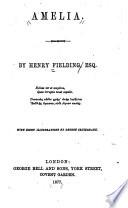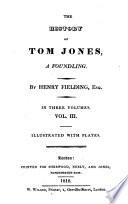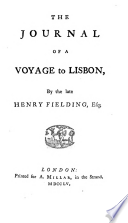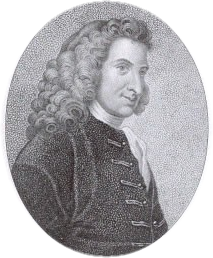Works

Amelia
Henry FieldingJoseph Andrews
Henry Fielding
The History of Tom Jones, a Foundling
Henry Fielding
Love in Several Masques
Henry Fielding
The Journal of a Voyage to Lisbon
Henry FieldingFamous Henry Fielding Quotes
“The only source of the true Ridiculous (as it appears to me) is affectation”
Author's Preface
Joseph Andrews (1742)
“It is much easier to make good men wise, than to make bad men good.”
Source: The History of Tom Jones, a Foundling
Book II, Ch. 14
Joseph Andrews (1742)
“Some folks rail against other folks, because other folks have what some folks would be glad of.”
Book IV, Ch. 6
Joseph Andrews (1742)
Henry Fielding Quotes about men
“I describe not men, but manners; not an individual, but a species.”
Book III, Ch. 1
Joseph Andrews (1742)
Book V, ch. 1
The History of Tom Jones (1749)
“Men who pay for what they eat will insist on gratifying their palates”
Book I, Chapter 1
The History of Tom Jones (1749)
Henry Fielding Quotes about nature
Author's Preface
Joseph Andrews (1742)
Henry Fielding: Trending quotes
“Money is the fruit of evil as often as the root of it.”
Don Quixote in England (1731), Act I, scene vi http://books.google.com/books?id=8_VbAAAAQAAJ&q=%22Money+is+the+fruit+of+evil+as+often+as+the+root+of+it%22&pg=PA13#v=onepage
Source: The History of Tom Jones, a Foundling
Henry Fielding Quotes
Fielding, Henry; ed. by William Ernest Henley. 1903. The Complete Works of Henry Fielding, Esq: Miscellaneous writings. W. Heinemann. p. 162
“Guilt has very quick ears to an accusation.”
Book III, ch. 11
Amelia (1751)
Abraham Adams, speaking of his host, Wilson.
Book III, Ch. 5
Joseph Andrews (1742)
Book V, Ch. 10
The History of Tom Jones (1749)
“Oh, the roast beef of England,
And old England's roast beef!”
The Grub Street Opera (1731), Act iii, scene 2; reported in Bartlett's Familiar Quotations, 10th ed. (1919)
“Oons, sir! do you say that I am drunk? I say, sir, that I am as sober as a judge.”
Don Quixote in England (1731), Act III, scene xiv
“One fool at least in every married couple.”
Book IX, ch. 4
Amelia (1751)
“This story will not go down.”
Tumble-down Dick; reported in Bartlett's Familiar Quotations, 10th ed. (1919)
“Can any man have a higher notion of the rule of right and the eternal fitness of things?”
Book IV, Ch. 4
The History of Tom Jones (1749)
“When children are doing nothing, they are doing mischief.”
Book XV, Ch. 2
The History of Tom Jones (1749)
Book I, Chapter 1
The History of Tom Jones (1749)
“Depend on me; never fear your enemies. I'll warrant we make more noise than they.”
Eurydice Hissed : or A Word to the Wise (1736) in The Works of Henry Fielding (1775) in Twelve Volumes, Vol. IV, p. 222
Jonathan Wild (1743, rev. 1754), Book III, ch. 7
Book IX, Ch. 10
Amelia (1751)
Book XI, Ch. 4
The History of Tom Jones (1749)
Act III, sc. vii
The Miser (1733)
The Journal of a Voyage to Lisbon (1754), Introduction
“Thwackum was for doing justice, and leaving mercy to heaven.”
Book III, Ch. 10
The History of Tom Jones (1749)
“Much may be said on both sides.”
Spectator, No. 122.
Bartlett's Familiar Quotations, 10th ed. (1919)
“Hairbreadth missings of happiness look like the insults of Fortune.”
Book XIII, Ch. 2
The History of Tom Jones (1749)
“Life may as properly be called an art as any other.”
Book I, Ch. 1
Amelia (1751)
Book I, Chapter 2
The History of Tom Jones (1749)
“It is a trite but true observation, that examples work more forcibly on the mind than precepts.”
Book I, Ch. 1
Joseph Andrews (1742)
“It hath been often said, that it is not death, but dying which is terrible.”
Book III, Ch. 4
Amelia (1751)
“When I'm not thanked at all, I'm thanked enough;
I've done my duty, and I've done no more.”
Source: Tom Thumb the Great (1730), Act I, sc. iii
Act II, sc. xi
Love in Several Masques (1728)
Act III, sc. vii
Love in Several Masques (1728)
“Every physician almost hath his favorite disease.”
Book II, Ch. 9
The History of Tom Jones (1749)
“These are called the pious frauds of friendship.”
Book VI, Ch. 6
Amelia (1751)
Book I, Chapter 6
The History of Tom Jones (1749)
